A Sweet Taste of the Countryside
Puffed rice cakes are a traditional snack that is popular in Taiwan, the southern part of mainland China, India, and Japan. They are still made using original cooking methods. First, the rice is roasted in a pressure cooker where its expansion is limited until the moment the cooker is opened. With a bang, the rice multiplies in size. "I warn people before the bang then apologize if anyone appears frightened," Xie says. "Despite these precautions, an upset passerby once yelled at me. I apologized again and offered him a rice cake. While his anger disappeared after the first bite, he told me to give a louder warning next time." This is the 10th year that Xie has driven his stall through the city streets. Whether at the height of summer, in the dead of winter, or under an umbrella in the rain, Xie presses on. If he burns himself on the pressure cooker, he pours water over the wound for relief. Earplugs are essential for muffling the loud "bangs," but Xie often forgets. There have been times when he has roamed the streets selling puffed rice cakes for a month without a single day of rest. Over the past decade, business has been good, though Xie sometimes longs for home and the life he led as a child. "Having been born into an agricultural family, my grandfather, uncles, and father were all farmers. I would join them in transplanting rice seedlings, patrolling and weeding the fields, and harvesting and transporting the rice. One winter when the fields lay fallow, the children gathered to dig a massive hole that was as wide as the outstretched arms of an adult and waist deep. This was turned into an earthen oven that supplied food for over 200 people from our extended family. Afterwards, we forgot to fill the hole. When the adults were preparing the fields the machinery they were using fell in." Moments such as these were a regular occurrence in the Changhua (彰化) countryside, but they didn't erase the images of Xie's elders toiling away in the fields. This was why Xie packed his bags at the age of 23 and moved to the city in search of opportunity. Xie had never lived outside Changhua and had even done his military service at the nearby Chenggong Ling (成功嶺) training center. Upon arriving in Taipei, Xie started as a realtor. While he no longer counted scarecrows among his colleagues, he himself began to feel like a scarecrow. After four years of the real estate grind, Xie decided that freedom was very important. About this time, a friend recommended making puffed rice cakes. Xie dove into this new venture headfirst. After learning to make the cakes, Xie purchased a modified motorcycle and hired a mechanic to add a platform, cooking equipment, a motor, and steel netting. When the stall was complete, Xie embarked on his new adventure. Although just a street-side vendor, Xie chose a name for his business, "Fumi Puffed Rice Cakes" (富米米香). He explains that, "Fumi means 'prosperous rice,' plus it's my cousin's name and I like the sound of it." Xie's family soon began to benefit from his good fortune. "Most farmers with limited marketing channels can only sell to wholesalers at low prices," Xie adds that, "Now, whenever the harvest is done, I ask my family to send a portion of their rice to Taipei. I pay above market price to help the farmers and in return I get a quality guarantee." Rice is a bridge between the city and countryside. As Xie reminisces on life in the farming village where he grew up, he remembers gathering around a similar stall as a child. He and his friends would keep their eyes fixed on the pressure cooker and spring into action when they heard the "bang." They would stick out their hands to catch the grains of rice that scattered and took great joy in picking up crumbs off the ground. Scenes such as this are rare nowadays due to hygiene concerns and improvements that have been made to pressure cookers. Puffed rice now drops into a closed net and other changes are apparent in terms of flavors, shapes, and packaging. Fumi Puffed Rice Cakes are available in over 10 flavors, from original white rice and brown rice to sweet flavors like peanut and sesame and salty flavors like mixed nuts. Xie even cooks black rice, glutinous rice, Job's tears, sorghum, buckwheat, and a mix of five grains. The shape of the cakes has changed based on customer recommendations. “Modern families are smaller. If we just made a big bag like in the past, they would never finish it. Plus, earlier thick cuts contributed to tooth injuries, which is why I make lollipop cakes that fit the mouth." Skill is also important in preparing the seasoning. While cooking the rice, Xie must bring a mixture of maltose and water to a boil then add ingredients such as sesame and nuts. The maltose is sufficient for slightly sweet flavors, though stronger flavors require either more salt or sugar. After about 10 minutes of cooking, the expanded rice is mixed with other ingredients. Evenly distributing the maltose holds the rice in place. This hot, soft mass is then placed on the prep table to be flattened with a roller. Since the rice sets within a minute, each step must be quick and precise. Some of the rice is packaged without being shaped or flavored. These healthy grains are suitable for mixing in milk or adding to lion's head meatballs. While cautious parents sometimes give Xie organic rice, which he uses to prepare rice cakes for their children, Xie is confident in the safety of his treats. He notes that, "Puffed rice cakes are very healthy. You can taste the ingredients, and the entire cooking process takes place in front of the customers, who then feel assured of food safety." To further enhance hygiene measures, Xie rents a first-floor apartment where he can park and wash his stall. After closing shop each night at 9 o'clock, Xie's first task, before counting the day's revenues or resting, is to wash all of his equipment. This daily routine provides an answer to a question that a customer once asked: "Why are other puffed rice cake stalls black and dirty, but yours shines?" Xie often drives his stall onto school campuses. One visit in particular evoked strong memories of his youth. Xie was invited to an elementary school in Bali (八里) to demonstrate how to make puffed rice cakes. Before he began, the students had to go to a farm beside the school to harvest and thresh rice. They then carried the golden grains to the school track to be laid out for drying. When the students were done, the school provided rice that was already dried to Xie. An ear-splitting "bang" was followed by the arrival of hot rice cakes. While observing the satisfied faces of the children as they ate the cakes, Xie thought of the saying "you reap what you sow." "During the 10 years I've lived in Taipei, I can count on one hand the number of times my parents have come to visit. They are concerned about disrupting my work and causing me to spend extra money. The less they visit, the harder I work, to make sure that they no longer have to worry about supporting themselves." The success of Fumi Puffed Rice Cakes has led Xie to begin planning a shop, though this would mean further putting down roots in Taipei. Xie says that when he thinks of his family and farm, he contemplates driving his stall back home, making puffed rice cakes along the way to pay for travel expenses. Xie's commitment to his family and yearning for home are feelings commonly shared among those who have moved to Taipei from other areas of Taiwan.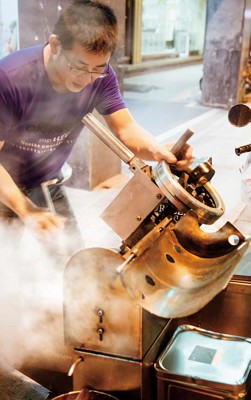 "Ladies and gentlemen, I suggest that you cover your ears. There's going to be a loud bang!" An explosive sound is followed by rising steam and the heavy aroma of rice. Xie Zhenwei (謝振瑋) apologizes as he disperses the lingering cloud.
"Ladies and gentlemen, I suggest that you cover your ears. There's going to be a loud bang!" An explosive sound is followed by rising steam and the heavy aroma of rice. Xie Zhenwei (謝振瑋) apologizes as he disperses the lingering cloud. 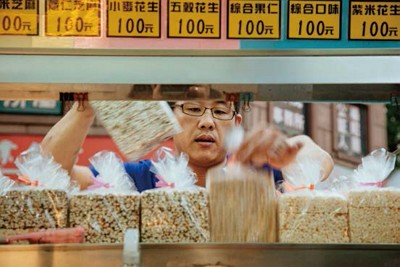 Memories of Childhood on the Farm
Memories of Childhood on the Farm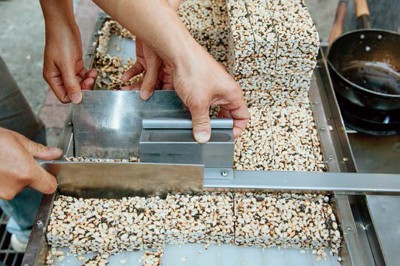 Improvements to Keep the Puffed Rice Cake Tradition Alive
Improvements to Keep the Puffed Rice Cake Tradition Alive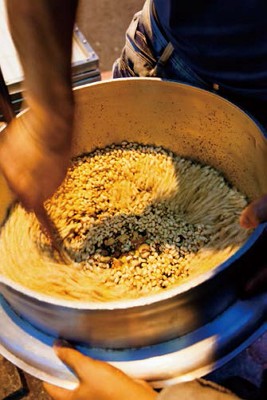 The Commitment of a Son Who Left Home
The Commitment of a Son Who Left Home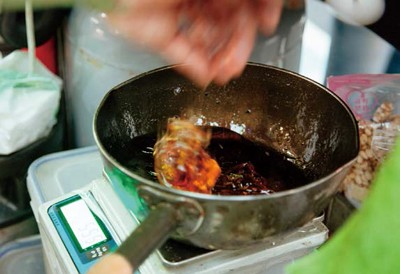 The children's hard work reminded Xie of how his parents planted rice paddies and vegetable fields and raised chickens and ducks. Despite their many duties, they never complained. Xie is also content with his lot in life. "While what I'm doing is ordinary, being able to work and maintain my enthusiasm is enough." When Xie was in his early 20s, his parents didn't want him to leave home because they worried about the risks and wanted their children always at their side. But when Xie made it known that his mind was made up, rather than trying to persuade him to stay, his parents offered financial assistance. They never inquire about his earnings or tell him how much to send home or to switch jobs. Xie is deeply appreciative of their support.
The children's hard work reminded Xie of how his parents planted rice paddies and vegetable fields and raised chickens and ducks. Despite their many duties, they never complained. Xie is also content with his lot in life. "While what I'm doing is ordinary, being able to work and maintain my enthusiasm is enough." When Xie was in his early 20s, his parents didn't want him to leave home because they worried about the risks and wanted their children always at their side. But when Xie made it known that his mind was made up, rather than trying to persuade him to stay, his parents offered financial assistance. They never inquire about his earnings or tell him how much to send home or to switch jobs. Xie is deeply appreciative of their support.

![Taiwan.gov.tw [ open a new window]](/images/egov.png)
